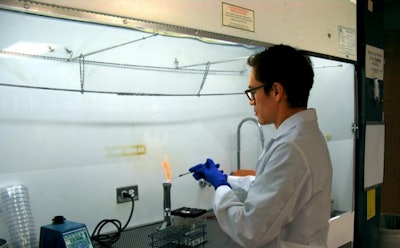
Researchers at the University of Missouri-Columbia have developed a durable antimicrobial coating that eliminates foodborne germs and prevents cross-contamination in food processing facilities, including in meat processing plants.
“Food contact surfaces may be sources of microbial contamination, and foodborne disease outbreaks have been linked to poultry products in the past,” Heather K. Hunt, an associate professor in the College of Engineering, and Azlin Mustapha, a professor in the College of Agriculture, Food and Natural Resources' Food Science program, explained.
“In this research, we developed a novel stainless-steel coating that helps to lower the level of and prevent microbial contamination of surfaces that come into contact with food.”
The research was recently published in Materials Chemistry and Physics.
More than 48 million Americans get sick from a foodborne illness each year and 3,000 people die as a result, the Center for Disease Control and Prevention (CDC) estimates. Contaminated poultry meat is the underlying cause of 19% of deaths attributed to foodborne illnesses.
Titanium dioxide
Made of titanium dioxide, the coating activates to kill bacteria in the presence of ultraviolet light, oxygen and water. It is applied to surfaces as a liquid but hardens when ready to use.
“It has tremendous photocatalytic and antimicrobial activity when exposed to ultraviolet light that result in the killing of microbial cells. Additionally, titanium dioxide, when made correctly, has the potential to be durable and robust, so that it can survive common cleaning processes,” Hunt and Mustapha said.
The research team has successfully tested the coating against E. coli, Salmonella and S. aureus. They also believe the coating’s disinfecting and durable qualities could help stop the spread of COVID-19 in food processing plants.
The coating could be used in a variety of food processing environments, including meat processing plants and ready-to-eat food lines like deli counters.
“This research is exciting because it provides another promising tool that could be applied in the poultry and meat industries to help control microbial contamination in the processing plants,” Hunt and Mustapha concluded.
Like what you just read? Sign up now for free to receive the Poultry Future Newsletter.


















